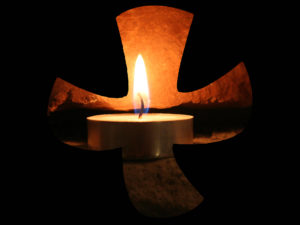
Our 7-year old daughter is sitting in front of our tent, humming a song. The atmosphere we drunk in at Taizé has stayed with her. We spent a week in Olinda, the domain for families in Taizé. I am not sure exactly what it is that’s touched her, but I think it has something to do with peace and quiet, even in the life of a seven year old. A break. Silence.
It also has something to do with the music. It finds its way to her heart. Into her soul. And it’s linked to the friendships that were born there in Burgundy. And the community. These are the same pillars on which Nijkleaster (New Cloister) has been built. And they don’t only touch my daughter: they touch me too. She hums:
In manus tuas, Pater, commendo spiritum meum
In manus tuas, Pater, commendo spiritum meum
(In your hands, Father, I put my soul)
All five of us are suffering the Taizé-blues. We’re at a campsite roughly 80km from the place we could hardly leave yesterday. It’s a campsite that would be considered as amazingly boring by our children in any other situation, but it exactly fits our needs now: silence, very few other people, the five of us together as a family. ‘Chants de Taizé’ is within reach, we play cards, have something to eat, play in the river, but no one has the desire for external entertainment. This is our cold turkey. We need to rehabilitate from a week that has once again given the five of us so much more than we could have grasped. Was it the holy spirit? Or just all those great people? Or are they maybe the same thing?
In Jorwert, in the north of the Netherlands, there’s a new monastery. The building isn’t ready yet, but on top of the pillars of silence, reflection and community, we expand on what’s already there: monastery walks, and special programmes for groups in the triple formula of Church, Pub and Monastery. The pillars haven’t been chosen randomly but have their origins in other traditions such as Iona and Taizé, and they shape a way of being a church that fits in with a sustainable way of life, with space for God, for you and for who you really are in the very depths of yourself. And of course for each other. Nijkleaster is a place where you can breathe again, where you can empty your mind, where you can listen to a text, sing, and where, above all, there is room for silence.
The church seems to be in crisis. Now that so few people go there, what is its added value? The world we live in seems so often to rely on logic, analysis, arguments, efficiency and speed. And right in the middle of that world, where so few people are attracted to the traditional church, people are looking for connections with others and with God. Places like Taizé and Nijkleaster are stopping places where people get the chance to not have to think, understand or explain. These are places where you can say that it’s difficult, so difficult, to find God, despite your intensive searching. Where the amount of words is limited, because all our talking can all too easily lead to a lack of true meaning. In manus tuas, Pater. I think these places are beautiful.
Jelle Waringa, February 2016
listen here:
Geef een reactie